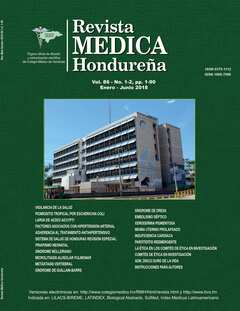Susceptibility of the larva de Aedes aegypti to bacillus thuringiensis var israelensis in Tegucigalpa, Honduras
Keywords:
Dengue, Bacillus thuringiensis, Aedes, Vector ControlAbstract
Introduction: Dengue is the viral disease transmitted by mosquitoes with the fastest spread in the world. In Honduras currently constitutes a major public health problem due to its high incidente. Bacillus thuringiensis var israelensis (Bti) is a biocontrol agent applied in vector control, it has been recently used as one of the strategies against Aedes aegypti in Honduras. The purpose of this study was to determine the susceptibility of Ae. Aegypti to Bti in Tegucigalpa, Honduras during 2014. Methods: A sample of 960 larvae of Ae. aegypti collected from containers in houses of La Cañada and Nueva Suyapa neighborhoods, located in Tegucigalpa, Honduras, were used. Bioassays were conducted according to the guidelines issued by the World Health Organization and the Latinoamerican Network for Vector Control. Twelve bioassays were carried out for each concentration used. Results: Four concentrations of Bti were analyzed: 0.5 mg/L, 1 mg/L, 2.5 mg/L and 5 mg/L. Larval mortality was recorded at 24 h. Larval mortality was estimated, 98.734 % for the dose of 0.5mg/L; 99 375 % for 1 mg/L; 100 % for 2.5 mg/L and 100 % for 5 mg/l. Conclusions: Bti has been proven to be effective against Ae. aegypti larvae, evaluation of this product have to be carried out systematically and periodically to ensure better results and prevent resistance development.
Downloads
262




